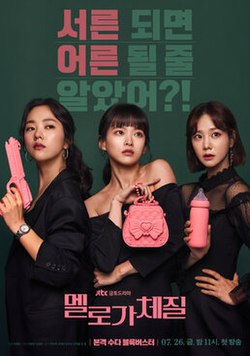
According to Google, a “Melodrama” is a sensational dramatic piece with exaggerated characters and exciting events intended to appeal to the emotions. At first, this seems like a strange choice of words for Be Melodramatic, whose everyday and ordinary characters lead everyday and ordinary lives.
So ordinary in fact, that if, like me, you have always envied drama characters because they are always perfectly hardworking, always answer phone calls, have limitless energy and always get a ton of things done each day; then JTBC‘s Be Melodramatic is the drama for you — at least, if you happen to be an unmarried, urban millennial. The intent behind Be Melodramatic is best discerned from the words of writer-director Lee Byung-heon, who said in an interview that he used up all the notes he had saved for 10 years to include relatable lines.
And relatable, the drama is. Female-centric, the show is anchored around three women, Im Jin-joo, Lee Eun-jung, and Hwang Han-joo, a drama writer, documentary director and marketing team head at a drama production company respectively. In the early episodes, Jin-joo (Chun Woo-hee), then still an assistant writer, is offered her first opportunity to see her script (two episodes for a show titled “Everything Will Be Alright When You Turn 30”) be produced into a drama.
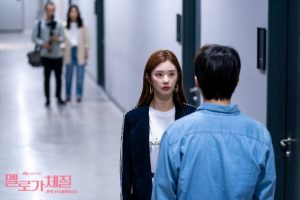
A rich world of fully fleshed out characters surrounds the trio — family members, co-workers, the network airing Jin-joo’s drama, Han-joo’s production company, and the trio’s university classmate, now an actress and the subject of Eun-jung’s documentary, and many more.
The drama’s timeline follows Jin-joo’s script in pre-production and the characters come to work together on Jin-joo’s drama. In the first of many meta references, it is hinted from the very start that the script Jin-joo is writing is loosely the script to the drama we are watching. As Jin-joo writes, the stories of Be Melodramatic‘s many characters come to life before our eyes.
The unassuming lyrics of the OST, particularly Jang Beom-jun‘s “Your Shampoo Scent In The Flowers”, give one a feel for the everyday nature of the show:
I felt the scent of your shampoo in the swaying flowers
Did you just pass by? I looked back but I just saw other people
Almost home, I’m just looking at my phone for no reason
Should I call you? I try gaining courage but I’m just in regret
At its core, Be Melodramatic is a romantic comedy, a slice of life and a coming of age drama, except its characters are approaching the age of thirty. It touches upon multiple progressive themes; and like any good coming of age drama, its charm lies in the writing and presentation of the characters, the dialogue and internal monologue, and not in action.
Though undoubtedly adults, the characters in Be Melodramatic are immature, like overgrown kids handling life without an adult supervisor. Within the deadlines and requirements of their jobs and families, these are the urban early-30-somethings of today — already past their quarter-life crises, free to do what they like, and living as best they can. Nearing the end of a decade (the twenties) full of uncertainty, their lives are slowly falling into place. The drama distinguishes them from characters in other dramas by allowing them to be free of dramaland’s usual moral constraints, yet keeping the characters real within a Korean context.
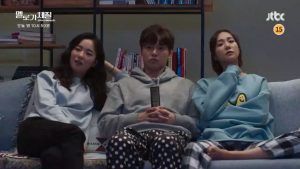
The trio live in Eun-jung’s apartment, with her openly gay brother. Not only is Hyo-bong (Yoon Ji-on) gay, he is also neither a caricature (à la Strong Woman Do Bong Soon) nor a lonely figure doomed to rejection by the man he likes (à la Moment at 18). Instead, Hyo-bong is in a stable, loving relationship. The drama sends a powerful message of acceptance with how normally the women treat Hyo-bong. It is thus a shock to see a restaurant owner kick Hyo-bong and his boyfriend out, giving straight viewers an insight into what homophobia looks and feels like.
With Eun-jung (Jun Yeo-bin) we see the early death of her boyfriend, her attempted suicide and inability thereafter to move on. Through the efforts of her sunbae and brother Hyo-bong, Eun-jung agrees to get therapy. It is heartening to see a drama present such a positive take on mental health issues and therapy. The show shows Eun-jung’s sessions and how they help her start to allow herself to grieve.
Han-joo (Han Ji-eun) is a single mother. Fiercely independent, she balances a job and child-rearing with the help of her housemates (including the gay Hyo-bong, who picks up her son after school when she has an appointment). Where other dramas would give us romance, Be Melodramatic allows a friendship to blossom between Han-joo and Chu Jae-hoon (Gong Myung). Instead Jae-hoon, in a live-in relationship with his girlfriend, has his own troubles. Don’t get me wrong though — Han-joo, the single mother, does date.
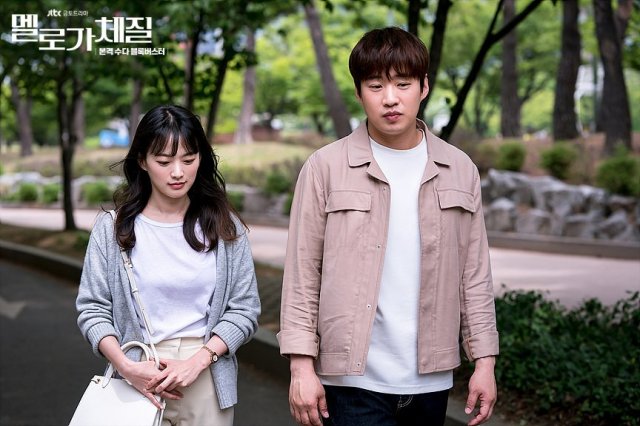
Female desire is part and parcel of daily life in Be Melodramatic. In fact, if most rom-coms present female leads who are “pure”, the female leads of Be Melodramatic are anything but. Jin-joo kisses her ex-boyfriend, Kim Hwan-dong (Lee Yoo-jin), passionately in flashbacks, and her new boyfriend, Son Beom-soo (Ahn Jae-hong), sweetly in the present. Actress Lee So-min (Lee Jo-bin) shares hilariously cringe-worthy kisses with her boyfriend. Even Writer Jung Hye-jun (Baek Ji-won), Eun-joo’s mentor, an older, successful drama writer, has a love life (sort of).
In spotlighting everyday characters who live outside the narrow boundaries set by society, and leaving them free to be who they are, whether or not they appeal to viewers, Be Melodramatic shows a rare acceptance of individuality. Just as Jin-joo’s script was deemed risky by the network, Be Melodramatic reported low ratings, averaging 1.488% nationwide. Low, even for a cable drama. But the gamble to keep the characters unique paid off. As Director Lee Byung-heon noted in the interview above, those who liked the drama, relate to it deeply.
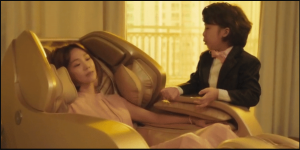
Unlike in Temperature of Love and Because This Life Is Our First, both of which also featured the female leads as drama writers, Jin-joo is shown to actually watch dramas. She quotes from them constantly, as does Director Son. The drama is self-aware: It parodies scenes from other dramas, discusses its product placements even as it places the product being discussed, informs viewers when it is coming to an end, and asks Jin-joo (as part of a script discussion) what she thinks became of the characters.
By the end, the title of the drama no longer seems odd. The ordinary and everyday characters of Be Melodramatic live their ordinary and everyday lives in a melodramatic manner. The show’s alternative title “Melo Is My Nature” perhaps explains this better. Being unashamedly melodramatic about their lives allows the characters to live them to the fullest — a leaf we all could take out of the show’s book.
With its multiple progressive themes, meta references, overt yet hilarious product placement, relatable dialogue and a charming cast, Be Melodramatic is a recommended watch.
(AGB Neilson, Google, Naver, YouTube; Images via JTBC, Lyrics via popgasa)


